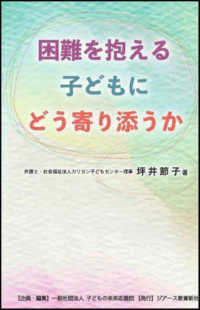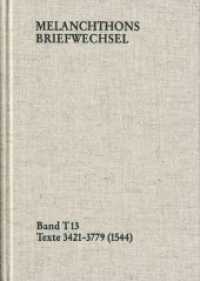基本説明
Chapters consider Greek and Confucian philosophy, Christian, Islamic and Buddhist religion, African tradition, as well as contemporary scientific approaches to the study of wisdom.
Full Description
The chapters in this volume are all devoted to a single question: Can wisdom be taught, or at least fostered? They span many different traditions and times, which generates both problems and opportunities. The most obvious problem is that of translation. As Curnow points out in the opening chapter, the word 'wisdom' is used to translate a variety of terms from antiquity that have only a partial overlap with modern work. It is interesting to consider that the Egyptian word 'seboyet' translates as either wisdom or instruction. The same is true of terms from Buddhism or Confucianism, or even the Ancient Greek tradition acknowledged as a source of most current views of wisdom in the West; all the terms drawn from other languages and traditions have only partially overlapping meaning. With this in mind, each chapter can be read independently of the others. However, we have also arranged them in an order that re?ects common themes that emerge despite this diversity. We have not arranged them by geographical region, or historical time, but rather by the sort of educational strategy they advocate to foster wisdom. The ?rst chapter by Curnow provides a basic overview of approaches to teaching for wisdom in the West. This is already a very ambitious undertaking, spanning ancient EgyptandMespotamiatotherenaissanceandthedawnofthemodemworld, where the term wisdom has fallen largely out of fashion until very recently.
Contents
Fostering Wisdom as Expertise.- Fostering Wisdom: A Psychological Perspective.- Teaching for Wisdom Through History: Infusing Wise Thinking Skills in the School Curriculum.- The Cultivation of Character Strengths.- Wisdom in Elementary School.- Master Zhu's Wisdom.- Teaching for Wisdom as Personal Transformation.- Wisdom and Learning to Be Wise in Chinese Mahayana Buddhism.- Beginner's Mind: Paths to the Wisdom that is Not Learned.- Ascending to Wisdom: A Christian Pedagogy.- Learning from Wise People.- The Wisdom of Plato's Phaedo.- Can Wisdom Be Taught? Kant, Sage Philosophy, and Ethnographic Reflections from the Swahili Coast.- Conclusion.- Developing Expert and Transformative Wisdom: Can Either Be Taught in Public Schools?.- Sophia's World: Episodes from the History of Wisdom.








